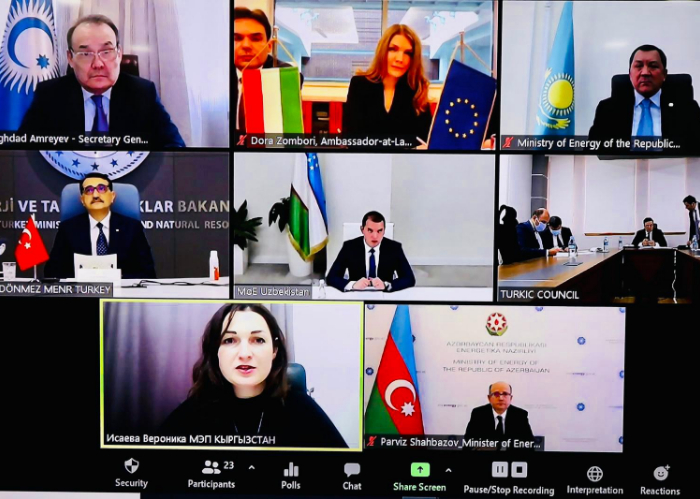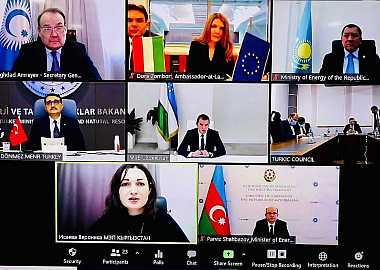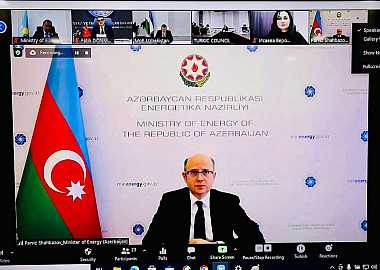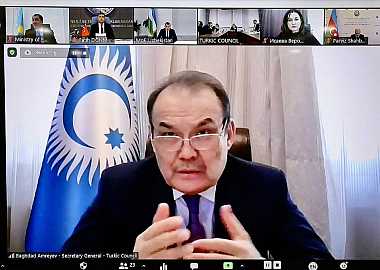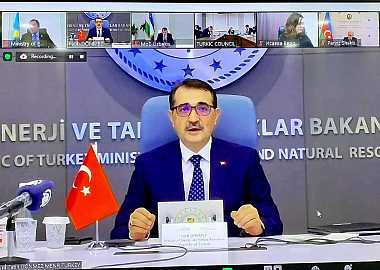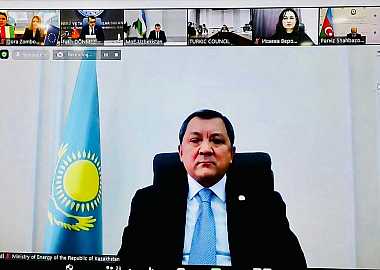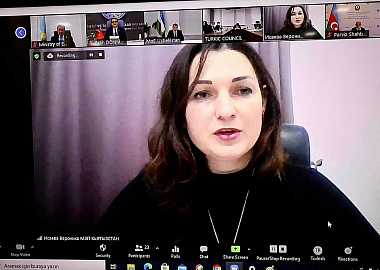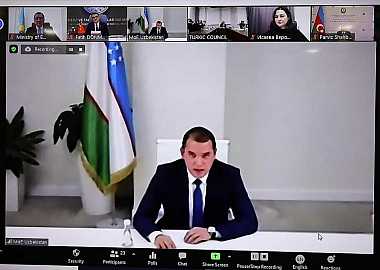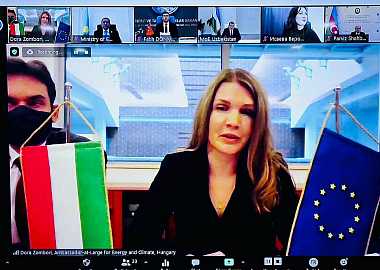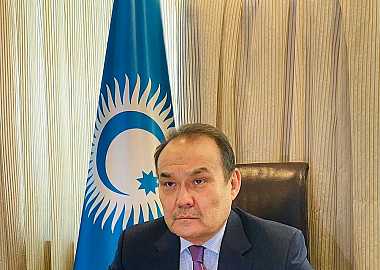The First Meeting of Energy Ministers of the Member and Observer States of the Turkic Council held on February 24, 2021 in virtual format.
The Meeting was moderated by H.E. Parviz Shahbazov, Minister of Energy of the Republic of Azerbaijan and co-chaired of the Secretary General of the Turkic Council H.E. Baghdad Amreyev and attended by H.E. Nurlan Nogayev, Minister of Energy of the Republic of Kazakhstan; H.E. Fatih Dönmez, Minister of Energy and Natural Resources of the Republic of Turkey; H.E. Ms. Veronika Isaeva, Deputy Minister of Energy and Industry of the Kyrgyz Republic; Mr. A.Alimuhammedov, Adviser of the Minister of Energy of the Republic of Uzbekistan; H.E. Ms. Dora Zombori, Ambassador-at-Large for Energy and Climate at the Ministry of Foreign Affairs and Trade of Hungary.
During the meeting, the Parties presented the capabilities of their countries in the energy sector, ongoing reforms, exchanged best practices and knowledge on energy efficiency and advanced energy technologies as well as briefed on the current investment projects.
They discussed their views on possibilities of further establishing multilateral energy cooperation, potential for development and diversification of energy routes, as well as improvement of interregional energy connectivity among the Member States.
In particular, B.Amreyev emphasized strategic importance of the energy cooperation for Turkic Council Member States. He stressed that the promotion of effective regional and bilateral energy cooperation, among other areas, is stated in the Nakhchivan Agreement as one of the main purposes and tasks of the Organization.
Secretary General added that during the First Summit of the Turkic Council held in Almaty in 2011 and the 7th Summit of the Turkic Council held on 15 October 2019 in Baku, the Heads of States underlined the importance of establishing cooperation in the energy sector and encouraged the Member States to cooperate and exchange know-how and expertise regarding security of supply, liberalization of the energy sector, establishment and/or operation of markets. They also emphasized the significant potential for establishing and improving cooperation in the areas of energy efficiency and renewable energy.
He pointed out that the energy cooperation is included as one of the key areas in the Turkic Council Strategy for 2025 and Vision for 2040 prepared by the Secretariat.
The Secretary General noted that the working platform established within the Turkic Council will ensure regional cooperation by strengthening coordination of the policies and efficient management of energy resources of our Member States.
Highlighting the huge prospects of the Member States in the development of the renewable energy resources, B.Amreyev stressed the necessity of collaboration in the implementation of renewable energy projects that is crucial for solving the region’s development problems and achieving environmental goals.
Head of Turkic Council underscored the establishment of cooperation in joint exploration and development of oil and gas deposits, efficient cross border electricity market, manufacture of advanced energy technologies, exchange of experiences and best practices as well as the establishment of joint production and distribution of petrochemical products among the Member States could be an important step towards the achievement of progress in this field.
Summarizing the outcomes of the Turkic Council Working Group meeting on Energy Cooperation held on 23 February 2021, he supported the proposal raised by the Parties on continuing discussions on the energy components under the sub-working group meetings.
Minister of Energy of Azerbaijan P.Shahbazov proposed to transform Karabakh into a "green energy" zone as a symbol of solidarity of Turkic World by cooperating in the field of renewable energy with Turkic companies through their participation in this process. He noted the potential of enhancing the cooperation among the Turkic Council Members in the realization of the renewable energy potential, establishment of market relations in the energy sector, energy regulation, and energy efficiency.
Azerbaijani Minister concluded that energy sector has these opportunities to ensure the development of our relations on an upward trajectory, as well as to achieve strategic goals of our countries within the Turkish Council.
Kazakhstan Energy Minister underlined that Kazakhstan interested in using the existing potential for increasing oil volumes along the existing routes and their diversification with the countries of the Turkic Council.
In addition, the Minister invited the companies of the Member States to take part in auction projects to attract investments and introduce technologies in renewable energy sources on a mutually beneficial basis and contribute to diversification of energy routes (oil and gas pipelines, electricity trade) in the region.
Kyrgyzstan Deputy Energy Minister Energy Ms. Veronika Isaeva stated that the development of green energy should be of high priority, given the strategic direction to ensure the countries’ energy security, due to the their high dependence on imported oil products and natural gas, and the continuous growth of energy consumption.
Praising the cooperation opportunities among the Member States in the different fields, F.Dönmez, Minister of Energy of Turkey underlined the importance of establishing collaboration and coordination in the field of energy within the framework of the Turkic Council.
Turkish Minister emphasized the importance of increasing the local production of energy by renewables, diversification of energy sources and supply safety. Touching upon the cooperation in the field of energy within the Turkic Council, Minister Dönmez further stated that Turkey is ready to share its experience in the energy sphere and ready to provide thematic training programs for the Member States as well as establish cooperation among energy companies.
Uzbek Energy Minister Adviser A.Alimuhammedov noted that this meeting is an effective platform for exchanging views on the development of the energy industry, and will also help to develop constructive solutions aimed at further improving cooperation in the fuel and energy industry.
The Ministers emphasized that the Turkic Council, as an international organization, has achieved concrete results in the field of science, technology, education, health care, culture, sports and tourism, and in this regard, it is necessary to increase its efficiency also in the energy sector in order to bring even more benefits to the Turkic countries.
At the end of the meeting, Secretary General B.Amreyev made a short summary of the meeting, pointing out proposals raised by the Ministers such a the need for further diversification of energy routes, enhancing the local production of energy by renewables through close cooperation with regional and international organizations, as well as establishing the new mechanisms under Turkic Council for further developing new energy projects and attracting foreign investments to the sector.
He underlined that all proposals need to be conducted with the active involvement of all stakeholders for achieving a new level of cooperation in the field of energy among the Member States.
The Meeting was moderated by H.E. Parviz Shahbazov, Minister of Energy of the Republic of Azerbaijan and co-chaired of the Secretary General of the Turkic Council H.E. Baghdad Amreyev and attended by H.E. Nurlan Nogayev, Minister of Energy of the Republic of Kazakhstan; H.E. Fatih Dönmez, Minister of Energy and Natural Resources of the Republic of Turkey; H.E. Ms. Veronika Isaeva, Deputy Minister of Energy and Industry of the Kyrgyz Republic; Mr. A.Alimuhammedov, Adviser of the Minister of Energy of the Republic of Uzbekistan; H.E. Ms. Dora Zombori, Ambassador-at-Large for Energy and Climate at the Ministry of Foreign Affairs and Trade of Hungary.
During the meeting, the Parties presented the capabilities of their countries in the energy sector, ongoing reforms, exchanged best practices and knowledge on energy efficiency and advanced energy technologies as well as briefed on the current investment projects.
They discussed their views on possibilities of further establishing multilateral energy cooperation, potential for development and diversification of energy routes, as well as improvement of interregional energy connectivity among the Member States.
In particular, B.Amreyev emphasized strategic importance of the energy cooperation for Turkic Council Member States. He stressed that the promotion of effective regional and bilateral energy cooperation, among other areas, is stated in the Nakhchivan Agreement as one of the main purposes and tasks of the Organization.
Secretary General added that during the First Summit of the Turkic Council held in Almaty in 2011 and the 7th Summit of the Turkic Council held on 15 October 2019 in Baku, the Heads of States underlined the importance of establishing cooperation in the energy sector and encouraged the Member States to cooperate and exchange know-how and expertise regarding security of supply, liberalization of the energy sector, establishment and/or operation of markets. They also emphasized the significant potential for establishing and improving cooperation in the areas of energy efficiency and renewable energy.
He pointed out that the energy cooperation is included as one of the key areas in the Turkic Council Strategy for 2025 and Vision for 2040 prepared by the Secretariat.
The Secretary General noted that the working platform established within the Turkic Council will ensure regional cooperation by strengthening coordination of the policies and efficient management of energy resources of our Member States.
Highlighting the huge prospects of the Member States in the development of the renewable energy resources, B.Amreyev stressed the necessity of collaboration in the implementation of renewable energy projects that is crucial for solving the region’s development problems and achieving environmental goals.
Head of Turkic Council underscored the establishment of cooperation in joint exploration and development of oil and gas deposits, efficient cross border electricity market, manufacture of advanced energy technologies, exchange of experiences and best practices as well as the establishment of joint production and distribution of petrochemical products among the Member States could be an important step towards the achievement of progress in this field.
Summarizing the outcomes of the Turkic Council Working Group meeting on Energy Cooperation held on 23 February 2021, he supported the proposal raised by the Parties on continuing discussions on the energy components under the sub-working group meetings.
Minister of Energy of Azerbaijan P.Shahbazov proposed to transform Karabakh into a "green energy" zone as a symbol of solidarity of Turkic World by cooperating in the field of renewable energy with Turkic companies through their participation in this process. He noted the potential of enhancing the cooperation among the Turkic Council Members in the realization of the renewable energy potential, establishment of market relations in the energy sector, energy regulation, and energy efficiency.
Azerbaijani Minister concluded that energy sector has these opportunities to ensure the development of our relations on an upward trajectory, as well as to achieve strategic goals of our countries within the Turkish Council.
Kazakhstan Energy Minister underlined that Kazakhstan interested in using the existing potential for increasing oil volumes along the existing routes and their diversification with the countries of the Turkic Council.
In addition, the Minister invited the companies of the Member States to take part in auction projects to attract investments and introduce technologies in renewable energy sources on a mutually beneficial basis and contribute to diversification of energy routes (oil and gas pipelines, electricity trade) in the region.
Kyrgyzstan Deputy Energy Minister Energy Ms. Veronika Isaeva stated that the development of green energy should be of high priority, given the strategic direction to ensure the countries’ energy security, due to the their high dependence on imported oil products and natural gas, and the continuous growth of energy consumption.
Praising the cooperation opportunities among the Member States in the different fields, F.Dönmez, Minister of Energy of Turkey underlined the importance of establishing collaboration and coordination in the field of energy within the framework of the Turkic Council.
Turkish Minister emphasized the importance of increasing the local production of energy by renewables, diversification of energy sources and supply safety. Touching upon the cooperation in the field of energy within the Turkic Council, Minister Dönmez further stated that Turkey is ready to share its experience in the energy sphere and ready to provide thematic training programs for the Member States as well as establish cooperation among energy companies.
Uzbek Energy Minister Adviser A.Alimuhammedov noted that this meeting is an effective platform for exchanging views on the development of the energy industry, and will also help to develop constructive solutions aimed at further improving cooperation in the fuel and energy industry.
The Ministers emphasized that the Turkic Council, as an international organization, has achieved concrete results in the field of science, technology, education, health care, culture, sports and tourism, and in this regard, it is necessary to increase its efficiency also in the energy sector in order to bring even more benefits to the Turkic countries.
At the end of the meeting, Secretary General B.Amreyev made a short summary of the meeting, pointing out proposals raised by the Ministers such a the need for further diversification of energy routes, enhancing the local production of energy by renewables through close cooperation with regional and international organizations, as well as establishing the new mechanisms under Turkic Council for further developing new energy projects and attracting foreign investments to the sector.
He underlined that all proposals need to be conducted with the active involvement of all stakeholders for achieving a new level of cooperation in the field of energy among the Member States.


